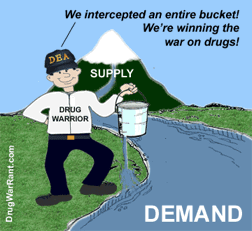Telecom Policy Lessons from the War on Drugs: Controlling GPS & Cellular Jammers

A New York Times editorial today on telephone calling rates for prison inmates was the immediate stimulus for this post
After nearly a decade of delay, the Federal Communications Commission is finally focusing on the private telephone companies that charge outrageously high rates for the calls that many of the nation’s 1.6 million prison inmates make to stay in contact with their families.
The commissioners are considering a proposal to seek public comment on prison phone regulation. They need to act to end the burdensome charges that can make a single phone call from prison as expensive as an entire month of home phone service. Prison calls are so expensive because inmates must place them through independent companies that pay the state corrections departments a “commission,” essentially a legal kickback. A 15 minute call can cost a family as much as $17. For struggling families who want to keep in touch with loved ones behind bars, this can sometimes mean choosing between a phone call and putting food on the table.
Readers may recall that your blogger helped the South Carolina Department of Corrections on the contraband cell phone in prison issue. South Carolina is unusual among states in that state law prohibits high prices on calling rates for inmates - the original “captive audience”. But most other states do exactly what NYT is talking about!
I recall a meeting with a high FCC official on the prison cell phone issue and mentioned as an aside that FCC had jurisdiction over the pay phone in prison issue. He expressed total surprise! So while FCC has a page entitled “Hang Up on High Public Pay Phone Rates”, it has taken a hands off approach to the rates charged to people with no ability to “make a choice”. While you may think prisoners deserve this as part of their punishment, there are direct side effects that impact all of society:
- Studies have shown that inmates who maintain family ties are less likely to slide into recidivism and the resulting large costs for society.
- Since the cost of illicit cell phone use is much less than the exorbitant rates charges by “legitimate” prison phone suppliers, there is a large “demand pull” for contraband cellphones in prisons. While much of the use may be benign family contact, the non supervised aspect of this telecom leads to uses such as continuing illegal activities while imprisoned and even ordering murders!
Thus the action that NYT reports that FCC is considering will reduce the demand for contraband cell phones in prisons and will thus improve public safety and lower the need for both prison jamming systems and the “managed access” preferred by the cellular industry that is probably not affordable to state and local governments. I hope that the cellular establishment can see that actively supporting this proposal is also in their interest for these reasons as it will reduce the demand for cell phone jammers.
Demand Reduction for GPS and Cellular Jammers
GPS and cellular jammers are a growing problem. While FCC has an Enforcement Advisory on this issue and the Enforcement Bureau has issues some Notices of Apparent Liability (fines), there has been no criminal prosecution for violation of Section 302(b) of the Communications Act. It is unclear if this is due to lack of interest at FCC in pressuring DOJ for such prosecution or lack of interest in DOJ. As one who was involved in several criminal prosecutions during my “exile” period in EB’s predecessor in the late 1980s, this lack of prosecution is puzzling.
But let’s also ask why do people want cellular and/or GPS jammers? They aren’t cheap, typically costing a few hundred dollars and have been driven somewhat underground so you can’t exactly buy them at Radio Shack.
While hotels might have a profit motive to jam cell phones and force guests to use overpriced (and under regulated) phones in hotel rooms, I do not recall a case involving hotel jamming of guest cell phones in recent memory. I suspect that the main motivation for cell phone jamming is that some cell phone use is obnoxious and disruptive to others.
The Mahler/Marimba Moment
Visit msnbc.com for breaking news, world news, and news about the economy
The cellular establishment seems to have zero interest in addressing this “harmony” issue and just wants more jammer enforcement from FCC - which is as futile as drug enforcement without demand side reduction. But the cellular industry is an “800 lb. gorilla” in Washington that wants to throw its weight around and FCC, always a very political agency, likes to tell people “what they want to hear”.
On the GPS side, I was amused to read few months ago about a new euphemism “personal privacy devices” e.g. GPS jammers. Here’s how a GPS industry publication introduces the topic:
The name comes from the fact that the primary market for these devices consists of people who fear being tracked or monitored by GNSS in their vehicles.
Freight and delivery trucks, in particular, are now commonly monitored by their dispatch centers using GNSS and a communications link. This has significantly changed the working environment of truck drivers over the last decade, some of whom resent the resulting loss of independence. The 21st century has experienced an increasing fear of governmental or corporate surveillance and an attendant loss of personal privacy.
As one result of this, ordinary citizens may attempt to protect themselves from such surveillance, including the use of PPDs, without understanding the consequences of the measures they take. Stolen vehicles or vehicles involved in illegal activities are other examples of potential PPD sources.
But like the cell industry, the GPS industry sees the solution to the problem as purely enforcement on the “supply side”. And just like in the War on Drugs, this one sided approach is doomed to failure.
Note the line “ ordinary citizens may attempt to protect themselves from such surveillance”. Is protecting oneself from intrusive surveillance such an unreasonable goal? (Yes, I am a “card carrying ACLU member”.) Perhaps the GPS establishment should do some soul search here and see if they can try to separate the safety critical navigation functions of GPS from the intrusive functions of GPS. For example, does law enforcement use of GPS have to be focused on the main civil L1 frequency or is that just a convenient way for the FBI to use cheaper equipment without counting the resulting inevitable economic “externalities”.
GPS technology has many miraculous uses in our society from the ubiquitous car mapping systems to many systems than enhance public safety including increasing use by FAA to decrease cost and increase the effectiveness of its aircraft navigation systems. But if much of the public associates GPS with privacy intrusions there will be inevitable spectrum conflict. It would be nice to view enforcement as the sole answer. It isn’t.






![Validate my RSS feed [Valid RSS]](valid-rss-rogers.png)

